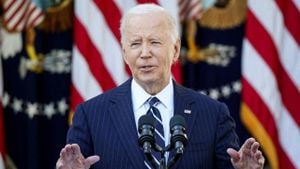The 2024 U.S. Presidential Election is shaping up to be one of the most contentious political arenas the nation has seen, with layers of complexity surrounding candidates, their campaigns, and the pyrotechnic atmosphere of public perception. President Joe Biden has announced his intention to run for re-election, aiming to continue the policies set during his current tenure, but already faces skepticism from his own party. Compounding Biden's challenges is Vice President Kamala Harris, who finds herself under the political microscope as potential voters and party loyalists question her ability to carve out her own identity apart from the current administration.
Widespread disapproval of Biden, highlighted by his persistent approval ratings hovering around 40%, is not just numerical—it’s palpable. Many voters express their frustration with the administration’s handling of issues like inflation and international relations, which has led to speculation about whether Biden can galvanize enough support to secure victory against his likely opponent, former President Donald Trump.
At the heart of Harris’s struggle is the desire to establish her own narrative as she positions herself for the run. During her ascent, she has been criticized for her lack of differentiation from Biden, sparking conversations around whether voters see her as merely continuing his legacy. This has become increasingly important as recent polls reveal 74% of respondents want to see Harris take the reins and outline how her presidency would differ from Biden's.
"Every president has to cut their own path," Biden asserted at the Philadelphia Democratic City Committee Autumn Dinner, referring to the balance Harris must strike between her loyalty to him and her vision for the country. His words seemed aimed at reassuring both her and the electorate about her capacity to lead independently. But with Trump actively underlining this criticism during his rallies, calling out moments where Harris has echoed Biden's decisions, the pressure on her to define her path has never been more intense.
Adding to the complication, Harris’s consultant team has indicated efforts are underway to refine her campaign message, focusing on how she might advocate for key changes. Biden’s comments about Harris needing to cement her identity as the future leader reflect genuine concern about voter perception and the imperative to distance her agenda from Biden’s record.
On the other side of the aisle, Trump is painting himself as the candidate of change, attempting to capitalize on Biden's unpopularity. He's begun linking Harris directly to Biden, aiming to illuminate what he sees as their shared failures. This strategy seeks not only to win back his supporters but also to persuade undecided voters who may be feeling disillusioned with the current administration.
The Democratic primary process has sparked its own share of debate, especially after recent comments made by House Speaker Nancy Pelosi. She suggested during a podcast interview on The New York Times platform, if Biden had exited the race earlier and prompted more competition within the party, Harris may have had a fighting chance. This sentiment aligns with concerns within Democratic circles about the consolidation of power early within the party, which some believe stifled genuine competition and innovation.
Pelosi remarked, "had the president [Biden] gotten out sooner, there may have been other candidates in the race." The former Speaker’s perspective showcases the delicate balance Democrats are trying to strike: maintaining loyalty to established leadership without losing touch with the grassroots movement demanding change. This has ignited discussions around the viability of open primaries and their potential to invigorate the party's voter base.
The question is, can the Democratic Party recover lost ground among working-class voters? Many see social issues as pivotal, as highlighted by Pelosi’s assertion about cultural issues like gun control and LGBTQ+ rights driving away the traditional base. This speaks to the heart of what Biden and Harris both must tackle if they hope to unify the party and rally broader support as election day approaches.
It’s clear the upcoming election, scheduled for November 2024, is going to be more than just another political contest; it’s likely to serve as a referendum on the current administration’s performance. Candidates will have to define their legacies swiftly and considerably to resonate with the American populace, especially as light shines brightly on Harris’s ability to present herself as more than just the vice president. The added layer of Trump’s comeback strategy poses another problem, as the former president appears eager to capitalize on Biden’s current vulnerabilities.
It's undeniable voters yearn for change. Headlines across the political spectrum reflect this sentiment as numerous polls indicate significant dissatisfaction. Issues surrounding the economy, healthcare, education, and social justice will dominate discourse, giving candidates ample opportunity to outline their proposed solutions.
While Harris is at the forefront of this looming transition, her ability to assert her views and agenda could very well dictate the energy within the Democratic campaign. Her team is undoubtedly aware of the urgent need to present her as not just the successor but as the innovator—the leader who can bring fresh ideas to the White House.
Looking toward the future, Biden and Harris need not only to engage voters on policies but also to connect with what motivates individual concerns and aspirations. The potential for transformative leadership pivots on their ability to resonate personally, clearly articulately their vision for the future.
With the first primaries approaching and voter engagement teetering, both Biden and Harris are echoing commitment to progressive policies within their campaign. The need to galvanize support and inspire confidence among voters who may be questioning the administration is more pressing than ever.
Not to be overlooked is how the broader national mood shifts as economic indicators fluctuate, especially with inflation and overall consumer confidence playing significant roles. Biden’s administration must effectively argue its successes and draw clear divides between its vision for the country and Trump’s, should he secure the Republican nomination.
It’s not just about winning; it’s about defining direction for decades to come. The Democratic party must not only unite but excite potential voters wary of history repeating itself under Trump’s brand of governance. The spectacle of debates, campaign speeches, and strategic maneuvers will set the tone for what is undeniably the most intensely monitored Presidential campaign leading up to the 2024 election.
To sum up, where Biden and Harris can align their messaging will be pivotal, as well as how they navigate the treacherous waters of voter discontent. Their path forward hinges not just on their individual narratives, but on how effectively they tackle the pressing issues at hand and galvanize the party base for what many are dubbing the most consequential election of our time.



